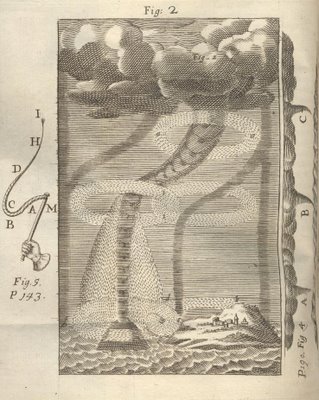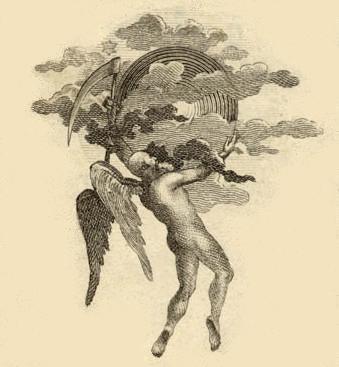'Fire, air, water, earth, we assert, originate from one another, and each of them exists potentially in each, as all things do that can be resolved into a common and ultimate substrate. [...] Whenever a particle of air grows heavy, the warmth in it is squeezed out into the upper region and it sinks, and other particles in turn are carried up together with the fiery exhalation. Thus the one region is always full of air and the other of fire, and each of them is perpetually in a state of change.' [Aristotle]
 'Meteorolgia De Igneis Aereis Aqveisq Corporibus' Franciscus Resta 1644 - 'deals in detail with comets, meteorology, earthquakes, rainbows, oceans, springs, rivers, precipitaion, and water in its various states.'
'Meteorolgia De Igneis Aereis Aqveisq Corporibus' Franciscus Resta 1644 - 'deals in detail with comets, meteorology, earthquakes, rainbows, oceans, springs, rivers, precipitaion, and water in its various states.' 'Fumifugioum' John Evelyn 1661 - 'one of the earliest classics of ecology. Evelyn suggested two remedies: that certain trades be removed several miles outside London, and that a belt of fragrant trees and shrubs be planted around the city limits. His efforts at legislation, however, failed.'
'Fumifugioum' John Evelyn 1661 - 'one of the earliest classics of ecology. Evelyn suggested two remedies: that certain trades be removed several miles outside London, and that a belt of fragrant trees and shrubs be planted around the city limits. His efforts at legislation, however, failed.' 'A Discourse Concerning the Origine and Properties of Wind. With a Historicall Account of Hurricanes, and Other Tempestuous Winds' Ralph Bohun 1671 - 'considered the first scientific attempt to present an explanation of weather phenomena.'
'A Discourse Concerning the Origine and Properties of Wind. With a Historicall Account of Hurricanes, and Other Tempestuous Winds' Ralph Bohun 1671 - 'considered the first scientific attempt to present an explanation of weather phenomena.'
 'Le Forze d’Eolo, Dialogo Fisico-Matematico Sopra gli Effetti del Vortice' Geminiano Montanari 1694 [The force of the wind {Aeolus?}: a physico-mathematical discussion of the vortex]
'Le Forze d’Eolo, Dialogo Fisico-Matematico Sopra gli Effetti del Vortice' Geminiano Montanari 1694 [The force of the wind {Aeolus?}: a physico-mathematical discussion of the vortex] 'Dissertation sur les Causes et les Variations des Vents' Nicolas Sarrabat 1730 - 'stated that winds are caused by the action of the sun's heat on the atmosphere.'
'Dissertation sur les Causes et les Variations des Vents' Nicolas Sarrabat 1730 - 'stated that winds are caused by the action of the sun's heat on the atmosphere.'
 'Dissertation Sur La Glace' Jean Jacques d'Ortous de Mairan 1749 - 'concerned with meteorological phenomena, cold and heat, how ice forms, and sources of heat in the earth.'
'Dissertation Sur La Glace' Jean Jacques d'Ortous de Mairan 1749 - 'concerned with meteorological phenomena, cold and heat, how ice forms, and sources of heat in the earth.' 'Experiments and Observations on Electricity Made at Philadelphia' Benjamin Franklin 1769 - 'Franklin's studies on cloud formation and the electrification of clouds constitute a major contribution to the science of meteorolgy.'
'Experiments and Observations on Electricity Made at Philadelphia' Benjamin Franklin 1769 - 'Franklin's studies on cloud formation and the electrification of clouds constitute a major contribution to the science of meteorolgy.' 'Electrometers' in 'Traité de Météorologie' Louis Cotte 1774 - 'The first general treatise of meteorology...To Cotte, meteorology encompassed phenomena concerning earthquake, aurora borealis, terrestrial magnetism, atmospheric electricity, and lunar periodicity, as well as temperature, atmospheric pressure, winds, and precipitation.'
'Electrometers' in 'Traité de Météorologie' Louis Cotte 1774 - 'The first general treatise of meteorology...To Cotte, meteorology encompassed phenomena concerning earthquake, aurora borealis, terrestrial magnetism, atmospheric electricity, and lunar periodicity, as well as temperature, atmospheric pressure, winds, and precipitation.' 'Essais sur l'Hygrométrie' Horace Bénédict de Saussure 1783 - 'described his hygrometer, an instrument which measures humidity; described the general principles of hygrometry as a science; and dealt with evaporation and the application of his researches to meteorology.'
'Essais sur l'Hygrométrie' Horace Bénédict de Saussure 1783 - 'described his hygrometer, an instrument which measures humidity; described the general principles of hygrometry as a science; and dealt with evaporation and the application of his researches to meteorology.' 'The climate of London : deduced from meteorological observations' Luke Howard 1833 - 'probably the most important English meteorologist of the nineteenth-century'. Known as the 'Godfather of the Clouds': he applied the Linnean naming system to clouds in an 1865 publication - cirrus, cumulus &c.
'The climate of London : deduced from meteorological observations' Luke Howard 1833 - 'probably the most important English meteorologist of the nineteenth-century'. Known as the 'Godfather of the Clouds': he applied the Linnean naming system to clouds in an 1865 publication - cirrus, cumulus &c. 'Gales in the Atlantic' Matthew Fontaine Maury 1857 - 'Maury's compilation of data on winds and currents was taken from manuscript ships' logs, enabling him to present a climatic picture of the surface winds and currents of all oceans, especially the Atlantic.'
'Gales in the Atlantic' Matthew Fontaine Maury 1857 - 'Maury's compilation of data on winds and currents was taken from manuscript ships' logs, enabling him to present a climatic picture of the surface winds and currents of all oceans, especially the Atlantic.' 'The Motions of Fluids and Solids, Relative to the Earth's Surface' William Ferrell 1860 - 'the first to understand in mathematical detail the significance of the earth's rotation.'
'The Motions of Fluids and Solids, Relative to the Earth's Surface' William Ferrell 1860 - 'the first to understand in mathematical detail the significance of the earth's rotation.'The above book images were of course arbitrarily chosen so they aren't necessarily indicative of relative importance of individual authors in the history of atmospheric science or meteorology. Mostly I just liked the images.
Aristotle's 'Meteorologica' was written in ~350BC and was virtually the only treatise on climate science until Galileo invented (?) the thermometer in the early 17th century and meteorology became a scientific discipline in conjunction with the development of measuring instruments.
San Diego's Mandeville Special Collections Library at the University of California have an old but extensive rare book exhibition: 'Weathering the Weather: The Origins of Atmospheric Science'. (The frames are a bit of a pain, but I just loaded each page as a new tab)
Timeline in the history of Meteorology at wikipedia.
And off on a tangent: The Cloud Appreciation Society.

No comments:
Post a Comment